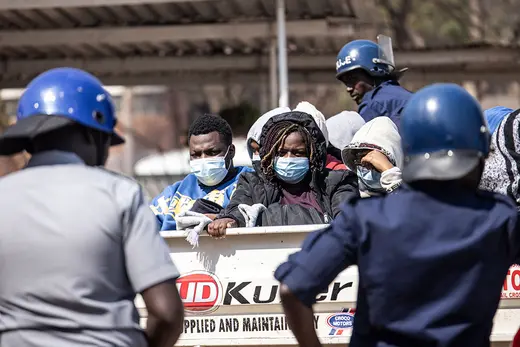Zimbabwe’s Flawed Election Results Meet With Regional Skepticism
Voter suppression and intimidation directed by the government marred Zimbabwe’s elections, which reaffirmed incumbent Emmerson Mnangagwa’s power and will likely prolong the country’s dysfunction and severe economic woes.
By experts and staff
- Published
Experts
![]() By Michelle GavinRalph Bunche Senior Fellow for Africa Policy Studies
By Michelle GavinRalph Bunche Senior Fellow for Africa Policy Studies
Zimbabwe’s government has declared incumbent Emmerson Mnangagwa the winner of the presidential contest. The opposition has rejected the result and outside observers have raised serious questions about the process. How flawed was this election?
No reasonable person would call these elections fair, which is why several observer missions, including the Southern African Development Community (SADC) and the European Union, issued statements pointing to profound flaws in the process. But the deck was stacked well before these missions arrived on the ground. The preelection climate featured draconian new legal restrictions on freedom of expression and a heavily biased state-run media. Opposition leaders and activists were harassed, assaulted, and in some cases arrested on spurious charges and tried by a compromised judiciary. The Zimbabwe Electoral Commission (ZEC), which is blatantly politicized and widely mistrusted [PDF], tilted the playing field in multiple ways, including undertaking a dodgy delimitation exercise that failed to account for the growth of Zimbabwe’s urban centers and neglecting to fulfill its legal duties around making an accurate electronic voters’ roll available to candidates.
Election Day itself was shambolic, with polling stations in opposition strongholds far more likely to experience significant delays and inadequate materials than others. Ruling party agents intimidated voters at “exit poll” tables where they recorded citizens’ personal details before they voted, while disinformation campaigns aimed to discourage people from turning up to vote. Independent journalists and election observers were denied entry to the country, and local observers working on the parallel vote tabulation were arrested.
When the ZEC announced that incumbent President Emmerson Mnangagwa had been reelected with roughly 53 percent of the vote, no one was surprised. The results of a parallel vote tabulation exercise are yet to be released. But the main opposition party, the Citizens’ Coalition for Change (CCC), has rejected the result and asserted that the country should redo the election.

In the aftermath of the election, what are the prospects for confronting Zimbabwe’s major challenges, including economic turmoil, political repression, and humanitarian issues?
More of the same governance that brought Zimbabwe to this point will not turn the country’s prospects around. Zimbabwe’s economic crisis is inextricably linked to its governance problems. A small number of elites continue to enjoy lucrative, often illicit, economic opportunities and are disinclined to support reforms that could threaten their interests. Meanwhile, the majority of Zimbabwe’s youthful population struggles with hyperinflation, sparse job opportunities, under-resourced human services, and crumbling infrastructure.
A process intended to bring the government and its creditors to an agreement on restructuring Zimbabwe’s $14 billion in external debt—an essential step toward gaining new support from international financial institutions—involves a number of economic and political benchmarks, including a credible election. Similarly, current U.S. legislation [PDF] prohibits U.S. support for multilateral debt relief or credit for Zimbabwe until the country holds a free and fair election and restores the rule of law.
What are the regional implications of the vote’s results?
Regional integration and development plans have been stymied by Zimbabwe’s economic dysfunction and crumbling infrastructure. Moreover, difficult conditions at home have driven an exodus of Zimbabweans seeking more opportunity, and more than three-quarters of a million of them now live in South Africa, where their legal status has become a hot-button political issue in light of that country’s own unemployment crisis. As former Mozambican President Joaquim Chissano noted earlier this year, Zimbabwe’s crisis “is having terrible consequences for the region as Zimbabwe lies at the heart of southern Africa.”
Despite the spillover effects of the country’s downward spiral, for years SADC largely ignored political repression in Zimbabwe, as neighboring leaders are reluctant to criticize Zimbabwe’s ruling party, which shares liberation movement credentials with many other dominant parties in the region, including South Africa’s African National Congress. This history makes the pointed SADC statement on the election’s flaws particularly important. The region may be running out of patience with Zimbabwe’s leadership.
Zimbabwe’s political instability has made it the target of Western sanctions, and the growing influence of competing powers such as China and Russia has pushedMnangagwafurther from the West. What might a second Mnangagwa term mean for the future of Zimbabwe’s engagement with the U.S., China, and Russia?
Zimbabwe has a long history of close relations with China, although Beijing has been less generous with its economic support to Harare in recent years. Relations with Russia, already warm, have deepened as the two countries position themselves as victims of biased Western sanctions in the wake of Russia’s invasion of Ukraine. Both China and Russia have mining interests in Zimbabwe, which has extensive natural resources, including gold, platinum, and diamonds.
The United States maintains targeted sanctions on specific individuals and entities in Zimbabwe. There are no blanket sanctions against trade and investment in Zimbabwe. But for many Western companies, Zimbabwe is an unattractive place to do business, because corruption and blurred lines between the ruling party, the military, and the state itself have distorted the investment climate. Elections that signaled a new commitment to civil and political rights in Zimbabwe would undoubtedly have been met with enthusiasm in the West, as the targeted sanctions regime has become an irritant in Western relations with other African states, and Zimbabwe’s vast lithium reserves could play an important role in the transition to a green economy. But the process thus far gives U.S. policymakers no reason to believe a more productive bilateral relationship is possible in the near future.
